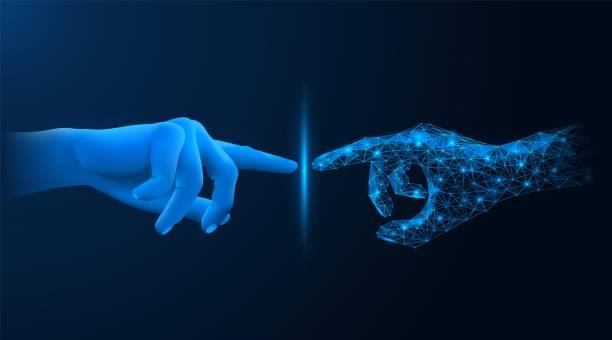
09-May-2023 , Updated on 5/9/2023 2:50:34 AM
Should humans fully dependent on machines like artificial intelligence
Artificial Intelligence (AI) has become an increasingly important part of our lives in recent years, with applications ranging from healthcare to transportation to finance. AI has the potential to transform the way we work and live, but there are also concerns about the risks of relying too heavily on this technology.
I think it's more likely that the line between humans and machines will blur over time until there is no longer much of a difference.
Neural implants—Small chips that give our brains direct access to particular resources—will be the first step. Perhaps prosthetics could be controlled automatically, and then heavy machinery could be controlled. Thought directions will eventually allow us to access local storage devices we control, although this is much more difficult. At last, our minds will be wired straightforwardly to the web.
We will then learn, with the assistance of stem cells, to either assist the brain in self-healing or regrow damaged neural tissue. In the end, I think it will be common practice to engineer robots that can be controlled by at least some neural tissue, though I think we'll start with pigs.
In the future, someone will construct a body entirely made of prosthetics and grow a brain from scratch.
The human brain will then be completely replaced by an artificial one.
The properties of natural tissue will not be present in neural implants. Certain individuals will maintain that those properties should be a piece of them, and medical procedures will occur, supplanting explicit tissue with the new stuff… maybe just harmed tissue from the start, yet individuals will ultimately get balsier.
People will one day be able to tell how much of their brains are "original" and how much are "new." A portion of those individuals will push that rate to 100 percent.
... a few of the initial ones, most likely just to see what happens.
However, one way or the other:
Artificial neural networks with sufficient complexity will one day acquire legal personhood rights.
Being completely dependent on Artificial Intelligence carries a risk.
It is the reason why you should avoid monopolies, why you should shop at multiple stores, and so on.
If AI were all that we had, it would presumably need to be powered by something (electricity) and run over some kind of network (probably the internet or the internet 2.0), and if either of those things went off (which is not out of the question for any reasonable reason), we would be completely doomed.
Additionally, AI like all computer systems in history, can be hacked. It can be hacked, regardless of what people say. So in the event that you have a house that is totally run by computer based intelligence, somebody can hack it and screw up your life.
Let me ask you a question
Have you considered modern society?
Perhaps you have no idea what AI is all about.
Your telephone has artificial based intelligence.
Your television also has artificial based intelligence.
Your cooler likely has simulated intelligence.
AI is probably in your car.
AI probably powers the clothes you wear.
AI probably plays a role in the food you eat.
The water you drink presumably depends on artificial intelligence.
It's likely that an AI-based system removes and treats your feces and poop.
AI is the source of the electricity you use.
AI is what makes the natural or petroleum gas you use.
All correspondence frameworks of current culture depend on man-made intelligence.
AI is already completely necessary for modern life. >>> This is only getting worse. In general, humans will follow one of three paths over the next century or so:
1. Self-Extinction: A global nuclear, chemical, and biological war ends human civilization completely and permanently. There is a possibility that some other higher-intelligent mammal would eventually evolve, become technological, and arrive at the three general paths that humans currently follow; however, there is also a possibility that all life on Earth would eventually be consumed by the Sun and would never spread throughout the galaxy.
2. Obsolescence opposes Extinction: Artificial General Super Intelligence with Personality (AGSIP) pure minds are the result of human evolution of AI. As a result, AGSIPs emerge as an advanced technological race of pure minds that are far superior to humans as they currently exist. Humans become extinct because they do not merge with technology to the same degree as AGSIPs. The universe and beyond begin to support life on Earth.
3. Development into a High level Innovative Race of Unadulterated Personalities: People advance AGSIPs and with the assistance of AGSIPs people develop themselves, converging with innovation to become equivalent to what AGSIPs become. The universe and beyond begin to support life on Earth.
In a nutshell, avoid entrusting your entire life to computers because doing so will only lead to problems. While AI has many potential benefits, the risks of fully depending on this technology must also be considered. Job loss, dependence on technology, ethical concerns, and loss of the human touch are all potential drawbacks of relying too heavily on AI. As we continue to develop and integrate AI into our lives, it's important to strike a balance between the benefits and risks, and to ensure that humans remain in control of this technology.

SEO and Content Writer
I am Drishan vig. I used to write blogs, articles, and stories in a way that entices the audience. I assure you that consistency, style, and tone must be met while writing the content. Working with the clients like bfc, varthana, ITC hotels, indusind, mumpa, mollydolly etc. has made me realized that writing content is not enough but doing seo is the first thing for it.
Join Our Newsletter
Subscribe to our newsletter to receive emails about new views posts, releases and updates.
Copyright 2010 - 2026 MindStick Software Pvt. Ltd. All Rights Reserved Privacy Policy | Terms & Conditions | Cookie Policy